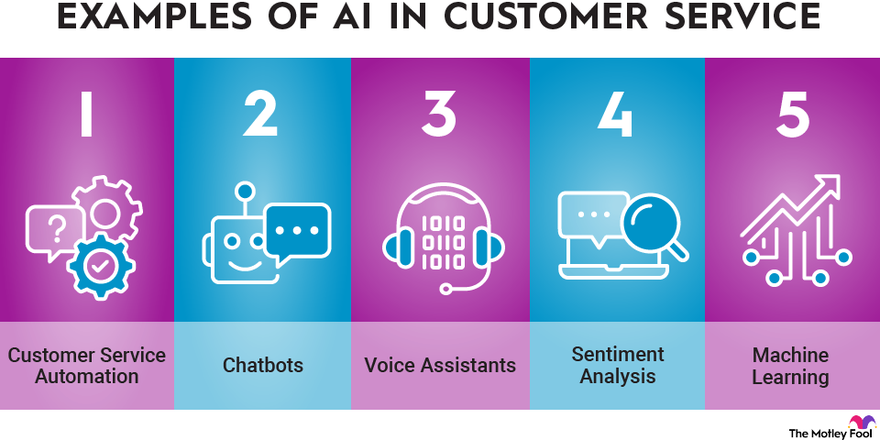Intercom built a next-generation customer service platform for an artificial intelligence (AI)-first world. The company's technology combines an AI bot, AI Help Desk, and proactive support tools into a unified platform to help companies interact with customers. Over 25,000 companies use Intercom to send more than 600 million messages each month.

The AI-powered customer service software company has quickly become a leader in helping companies improve customer communications. And it believes it's only scratching the surface of its potential.
That long growth runway has many investors eager to get their hands on its stock. Here's a look at everything you need to know about investing in Intercom stock ahead of a potential initial public offering (IPO).
Stock
Publicly traded?
Is Intercom publicly traded?
Intercom wasn't a publicly traded company as of early 2024. It was a private company backed by several venture capital funds. Notable investors in the company included Bessemer Venture Partners, Social Capital, Iconiq, Index Ventures, Kleiner Perkins, and Alphabet's (GOOG 1.75%)(GOOGL 1.68%) Google Ventures.
When will it IPO?
When will Intercom IPO?
Intercom didn't have an IPO on the calendar as of early 2024. However, many IPO watchers think the company could go public in the next year.
IPO
The company has taken steps to go public in the past. It even selected a stock ticker and set an IPO date. However, it never went through with the offering.
Intercom's founder and CEO, Eoghan McCabe, discussed the company's IPO prospects in an interview with The Currency in late 2023. He said the company didn't need to go public then because it was producing positive cash flow, and its employees could sell their shares on a secondary market.
However, it could pursue a broad liquidity event in the future, which could "come by way of an IPO, or maybe someone buys us along the way, or maybe we sell a big chunk of the company to an investor," McCabe said. A liquidity event isn't a near-term focus because, "right now, we're really enjoying being private," he said. That could change if it needs a capital infusion or wants to become a public company.
How to buy
How to buy Intercom stock
Since Intercom hasn't completed its IPO yet, investors can't buy shares of the technology company in their brokerage account. However, some online secondary platforms, like Forge Global (NASDAQ:FRGE) and EquityZen, offer accredited investors (i.e., high-net-worth individuals or those with a high income) an opportunity to invest in the pre-IPO shares of companies like Intercom.
Accredited investors who really want to buy pre-IPO shares should check out those platforms to see whether they have Intercom stock available.
Unfortunately, non-accredited investors must remain patient and wait until Intercom goes public to buy shares. In the meantime, they can consider investing in a publicly traded competitor to gain exposure to the same trends driving its growth. Following are three AI-driven software stocks to consider while you wait to see whether Intercom will ever complete an IPO.
Salesforce
Salesforce (CRM 1.28%) is the world's leading AI customer relationship management (CRM) platform. The company's unified platform, Einstein 1, combines CRM, AI, and data to empower companies to connect with customers.
It also offers a growing list of cloud-based products and solutions like Tableau, Slack, and MuleSoft. The company generated almost $35 billion in revenue in fiscal 2024 (an 11% increase) and $9.5 billion in free cash flow (50% growth from fiscal 2023).
HubSpot
HubSpot (HUBS -2.51%) has a long growth runway ahead, with more than 205,000 clients currently using its software, services, and support to attract and engage their customers. The company also operates a unified platform that includes AI-powered engagement hubs. HubSpot generated $2.2 billion in revenue in 2023 (up 25% from 2022) and $292.5 million in non-GAAP (generally accepted accounting principles) free cash flow (FCF).
ServiceNow
ServiceNow (NOW 1.48%) offers a cloud-based platform and solutions that help organizations digitize and unify so employees and customers can be more connected. It's also using generative AI to drive accelerated growth. The company reported almost $9 billion in revenue in 2023 (up 24% from 2022) and $2.7 billion in FCF.
Investors interested in adding one of these Intercom alternatives to their portfolio should follow this four-step guide on how to invest in stocks:
Step 1: Open a brokerage account
You'll have to open and fund a brokerage account before buying shares of any company. If you need to open one, here are some of the best-rated brokers and trading platforms. Take your time researching the brokers to find the best one for you.
Step 2: Figure out your budget
Before making your first trade, you'll need to determine a budget for how much money you want to invest. You'll then want to figure out how to allocate that money. The Motley Fool's investing philosophy recommends building a diversified portfolio of 25 or more stocks you plan to hold for at least five years.
You don't have to get there on the first day, though. For example, if you have $1,000 available to start investing, you might want to begin by allocating that money equally across at least 10 stocks and then grow from there.
Step 3: Do your research
It's essential to thoroughly research a company before buying its shares. You should learn about its competitors, review its balance sheet, find out how it makes money, and consider other factors to make sure you have a solid grasp on whether the company can grow value for its shareholders over the long term.

Step 4: Place an order
Once you've opened and funded a brokerage account, set your investing budget, and researched the stock, it's time to buy shares. The process is relatively straightforward. Go to your brokerage account's order page and fill out all the relevant information, including:
- The number of shares you want to buy or the amount you want to invest to purchase fractional shares.
- The stock ticker (CRM for Salesforce, HUBS for HubSpot, and NOW for ServiceNow).
- Whether you want to place a limit order or a market order. The Motley Fool recommends using a market order since it guarantees you buy shares immediately at market price.
Once you complete the order page, click to submit your trade and become a shareholder of these Intercom alternatives. Investors would follow the same steps to buy an IPO stock like Intercom if it ever goes public.
Profitability
Is Intercom profitable?
A vital aspect of researching a company is digging into its profitability. Ideally, you want to see that a company is growing its profitability or at least getting close to making money. Rising profitability is crucial to investors because it tends to drive a stock's performance over the long term.
The privately held Intercom doesn't publicly report its profitability. However, founder and CEO Eoghan McCabe provided some insight into the company's profitability in an August 2023 interview with The Currency. He noted that the company was losing money before he returned as the CEO and started cutting costs, including employees.
McCabe stated: "We had quarters where we lost more per quarter than we had in our entire history, and then we went from one-quarter of record losses to cash flow-positive again. We've been profitable since." It was cash flow-positive at the time of the interview, with $129 million in the bank. So, the company now has the financial flexibility to invest heavily in its growth without outside funding from investors.
Since Intercom can internally fund its growth with retained earnings, it doesn't need to go public to raise cash to continue expanding.
Should I invest?
Should I invest in Intercom?
Unless you're an accredited investor, you can't invest in Intercom yet, giving you time to decide whether you want to buy shares if and when the company goes public. Here are some reasons you might want to invest in Intercom's IPO:
- You think Intercom can continue to grow briskly as more companies use its AI-powered solutions.
- You believe Intercom offers better solutions than competing platforms, enabling it to continue growing while winning market share.
- You want to invest in founder-led companies.
- You're seeking to invest in high-growth companies.
- Adding Intercom would help diversify your portfolio.
- You want to invest in profitable companies that can self-fund growth with retained earnings.
On the other hand, here are some reasons you might decide not to invest in Intercom:
- You're not exactly sure what Intercom does or how it makes money.
- You don't think AI tools will live up to their hype.
- You're at or nearing retirement and are seeking lower-risk investments than a venture-backed technology company.
- You're concerned about Intercom's growing competition.
- You already hold lots of technology companies in your portfolio.
ETF options
ETFs with exposure to Intercom
Not everyone wants to actively manage a portfolio of individual stocks. Many would prefer the passive investing approach offered by exchange-traded funds (ETFs). ETFs enable you to gain some passive exposure to companies, specific themes, or the broader market.
Exchange-Traded Fund (ETF)
Since it's a private company, you can't get passive exposure to Intercom through ETFs. However, you can invest in the trends driving its growth through ETFs. Here are a few options to consider:
- iShares Global Tech ETF (IXN 1.48%): The fund provides investors exposure to the global technology sector. It had 117 holdings in early 2024, including Salesforce (its eighth-largest holding, at 2% of its net assets). The fund had a 0.41% ETF expense ratio.
- Global X Artificial Intelligence & Technology ETF (NYSEMKT:AIQ): The ETF seeks to invest in companies that should benefit from the development and utilization of AI. The fund had 84 holdings in early 2024, including Salesforce (its ninth-largest holding, at 3.1%). The ETF had a 0.68% expense ratio.
- ARK Innovation ETF (ARKK 2.53%): The ETF, actively managed by Cathie Wood, focuses on technology companies delivering disruptive innovation. The fund typically has 35 to 55 holdings. Its top five technology themes were intelligent devices (17.6% of its holdings in early 2024), next-gen cloud (13.3%), precision therapies (13%), neutral networks (12.2%), and digital wallets (10.6%). It had a 0.75% expense ratio.
Related investing topics
The bottom line on Intercom
Intercom is an early leader in using AI to help companies improve their customer communications. It's also a rarity among start-ups because it's already profitable enough to self-fund its growth. Those features have investors eagerly awaiting its IPO.
FAQ
Investing in Intercom FAQ
Is Intercom publicly traded?
Intercom wasn't a publicly traded company in early 2024. It was a privately held company backed by several venture capital funds.
Who are the investors in Intercom?
Intercom counts several well-known venture capital funds among its investors, including Bessemer Venture Partners, Iconiq, Index Ventures, Social Capital, Kleiner Perkins, and Alphabet's Google Ventures.
Who is the owner of Intercom?
Intercom is a private company owned by several venture capital funds, including Bessemer Venture Partners, Iconiq, Social Capital, Index Ventures, Kleiner Perkins, and Alphabet's Google Ventures.




































































































































































































































